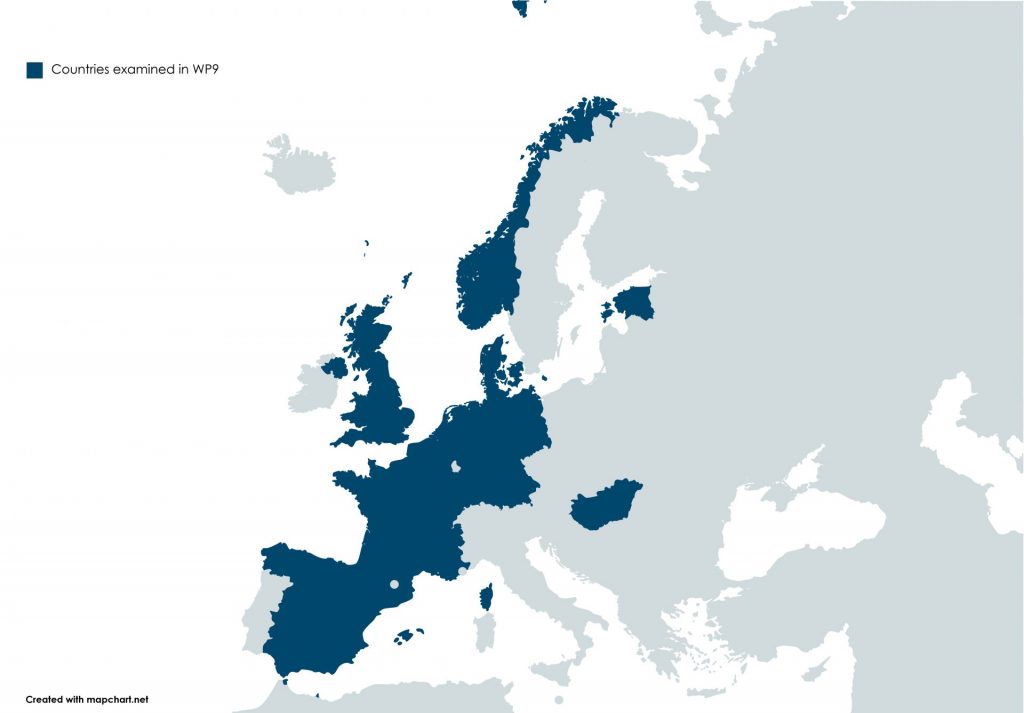Effects of Collaboration for Government Efficiency (Work Package 9 – WP9)
Led by Cardiff University (the UK), this work package conducted research from February 2020 to November 2021.
The WP9 team aimed to assess the impact of collaborative practices on efficiency, including their potential effects on administrative burden (‘red tape’).
In their research, the WP9 team asked the following research questions:
- What impact does a collaboration have on public sector efficiency and red tape?
- What is the role of ICT in fostering or inhibiting the collaboration?
To answer these questions, the WP9 team carried out the following activities:
- A literature review of efficiency and red tape to understand under what conditions collaboration can reduce costs and improve service quality;
- A quantitative assessment of organisational efficiency in a collaborative practice (shared services);
- Interviews of ‘best practices’ examples of collaborations across Europe which exploit ICT; and
- Identifying measures of efficiency to feed into the Collaboration Monitor, so that collaborations can compare the efficiency of their activities with others.
Research
The WP9 team initiated their work with a review of the existing literature on efficiency and red tape in collaborations. The team also analysed data from existing surveys and measures of red tape in Denmark, Hungary, Spain, and the UK. The researchers complemented the literature review by conducting interviews in ‘best practice’ collaborations in Belgium, Denmark, Estonia, France, Germany, Hungary, and Norway. See D9.1 Research report - A Review of Efficiency and Red Tape in Public Sector Collaborations.
An assessment of the impact of collaboration and ICT on efficiency and red tape was conducted using a qualitative approach in the countries covered by the TROPICO research.
The key findings from the literature review and the case studies are presented in a policy brief explaining how to reduce red tape and improve efficiency, including suggestions for policy development intended for policymakers and public service managers leading the design and implementation of sharing agreements. See D9.2 Policy brief - Public sector collaborations: Can they improve efficiency and reduce red tape?
The WP9 team also identified measures of efficiency and integrated them in the Collaboration Monitor - an online self-assessment tool enabling the practitioners engaged in collaborative arrangements to gauge their performance in legitimacy and efficiency and compare good practices in innovative collaboration connected to service delivery (see also Work Package 8 - Effects of Collaboration for Legitimacy and Accountability).
A discussion on the efficiency indicators and early results from the Collaboration Monitor will also be presented in a policy brief. See D9.4 Policy Brief, expected in November 2021.

Results and findings
The review of efficiency and red tape in collaborations, based on 52 scientific papers, presents a mixed but optimistic evidence base for the use of collaborations to improve efficiency.
Although there are many red tape reduction initiatives around Europe, there does not seem to be any evaluations across Europe to assess their impact. Therefore, the review does not include any studies on collaboration which measured any direct or proxy measure of red tape.
The main findings and trends related to efficiency are:
- Small to medium sized municipalities are likely to benefit most from collaborations in terms of scale economies, which are exhausted at larger municipality sizes.
- There are different impacts on efficiency depending on the service, which means that some services may be more suited to shared service or intermunicipal cooperation arrangements than others.
- Where cost savings are not found, other benefits such as service improvement, access to a greater range of expertise, and creation of innovative and sustainable service delivery may be derived from collaboration.
- Collaboration should not be entered into without thorough planning of governance, and accurate projections of costs and benefits, as results differ by governance structure, municipality size, type of service involved and potential transaction costs.
Scientific publications
Upcoming publications will be shared on the TROPICO community on the repository Zenodo.
The WP9 team published two articles in scientific journals:
Bellò, B., Downe, J., Andrews, R., & Martin, S. (2018). Does austerity drive public service innovation? Evidence from shared senior management teams in local government. Public Money & Management, 38(2), 131-138.
The article examines shared Senior Management Teams – a new response to financial austerity aiming to improve the efficiency of public services – and assesses their adoption in England.
Andrews, R., Bellò, B., Downe, J., Martin, S., & Walker, R. (2021). The Motivations for the Adoption of Management Innovation by Local Governments and its Performance Effects. Public Administration Review.
This publication looks into the adoption of shared Senior Management Teams in English local governments by analysing the economic, political and institutional antecedents and performance effects resulting from implementation of such management innovation.
The team
Led by Cardiff University (the UK), the WP9 team consists of partners from Central European University (Hungary), Hertie School (Germany), KU Leuven (Belgium), Roskilde University (Denmark), Tallinn University of Technology (Estonia), University of Antwerp (Belgium), University of Bergen (Norway), University of Louvain (Belgium), University of Potsdam (Germany), and University of Zaragoza (Spain).


























